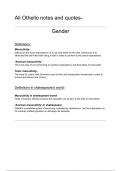All Othello notes and quotes-
Gender
Definitions:
Masculinity-
Defined as the social expectations of a man and refers to the roles, behaviours and
attributes that are linked with being a man in order to conform to the social expectations.
‘Anxious masculinity’-
The is the idea of not conforming to society's expectations and their ideas of masculinity
Toxic masculinity-
The need for control and dominance and its links with manipulative tendencies in order to
achieve dominance and control.
Definitions in shakespeare's world-
Masculinity in shakespeare world-
Traits of bravery, military prowess and reputation are all tied to the idea of masculinity
‘Anxious masculinity’ in shakespeare-
Othello's overwhelming fear of becoming cuckolded by desdemona and the implications on
his carefully crafted reputation is ultimately his hamartia.
, Critics to use for gender-
Jackie chirico~
“Iago’s treatment of women speaks to the gender conflict…shows how even though the main
goal is to hurt the man,Othello, its achieved at the women's expense”“
“His reputation is the only thing through which he can resist the racist attacks on his psyche,
by the Eurocentric white Venetians. And when his reputation seems to be spoiled by
Desdemona’s alleged adultery with Cassio, he is shattered. His entire identity collapses.”
“ the approach of subverting all expectations at the beginning of the play to then retreating
back to the stereotypes and prejudices that were originally challenged manage to alter the
original presentation of identity and what defines a person in context to the social construct”
“women are used by the villain to hurt the protagonist, manipulated and used”
“female characters are unknowingly thrown into the centre of Iago’s villainous plot and used
as pawns to take down Othello.”
E.A.Honigmann-
“despite his cleverness,he has never felt nor
understood…loyalty,friendship,respect,compassion”
analysis) Iago’s views on women especially when contrasted with Othello and his treatment
of women shows not only the misogynistic view on women but also the societal view on
women early on in the play.another factor into the strained relationship of Emilia and Iago is
that Alongside this Iago is unable to understand natural human feelings and emotion this
acts as a validating factor into the reluctant role Emilia played in his plan.
Sophie.A.Miller-
“Emilia’s love (for Desdemona) is Iago’s undoing”
analysis) This criticism reiterates the women prove to be powerful characters. Defying the
expectations that women should only be silent, subdued, and obey their husbands,
Emilia and Desdemona, at many times, speak out in their male-dominated atmosphere
“Shakespeare challenges typical representations of women and marriage of the time by
depicting two contrasting styles of marriage and portraying both female and male
characters with equally complex morals and emotions”
“Shakespeare challenges typical representations of women and marriage of the
time by depicting two contrasting styles of marriage and portraying both female
and male characters with equally complex morals and emotions”
, “Shakespeare calls the common dichotomous view of women into question with
his complex female characters”
“There is no middle ground acceptable for women. Only perfection in chastity
and faithfulness is acceptable, yet no one can reach perfection. Such
extremism is unrealistic and creates impossible standards. If only two options
are allowed, the imperfect woman is immediately evil. If women do not reach
the perfection expected of them, they are outcasts and not generally worth
considering to many classic male authors.Shakespeare, however, breaks the
dichotomy and creates much more realistic female characters”
S.N. Garner-
“Shakespeare designed Desdemona to be “neither goddess nor slut,”
Deats-
“In the first three acts of the play, therefore, Shakespeare has created in Desdemona an
oxymoronic blend of boldness and docility, sophistication and naivete, sensuality and
chastity, a formidable and independent woman who challenges the dominant feminine
ideals of the period”
“As Desdemona moves from articulateness to silence, Emilia progresses to
brazen speech”
“Othello is a critique of the usual domestic tragedy...It shows the realistic
struggle of women experiencing domestic abuse and being held to unrealistic
standards of subordination.”
Kimberly Lynch-
Desdemona's virtue, faithfulness, and simplicity make her an ideal in the
patriarch's private world of women, yet she cannot hold her own in the world of
men.
While Desdemona is inside the inner circle and Bianca is outside it, Emilia
seems to move in spheres connected to both.
Shakespeare paints Desdemona as clearly more than a stereotype, the reader
sees Desdemona, while Othello increasingly sees only Iago's Desdemona,
which is a snapshot of infidelity, a potential castrator, a threat to male patriarchy
When Othello accepts Desdemona as stereotype rather than individual




